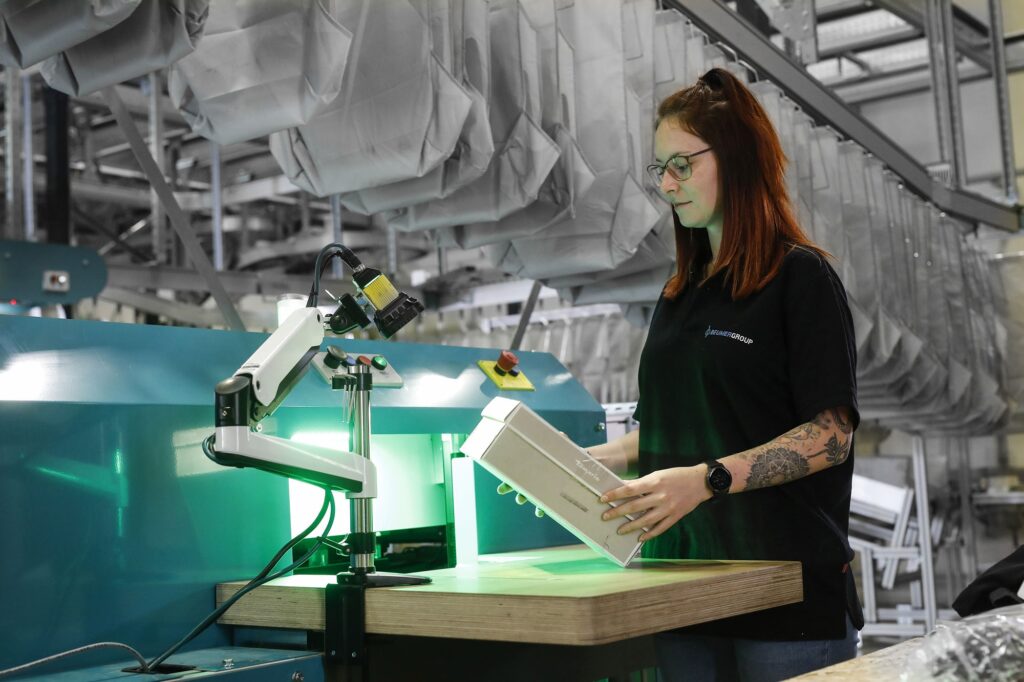Pouch Technology: Optimizing Reverse Logistics
8th February 2023

The cost of handling returns, reverse logistics, can have an enormous effect on a logistics facility’s bottom line. Unless action is taken the problem can only get worse as omnichannel shopping becomes increasingly prevalent and the rate of returns continues to rise. Any returns that simply languish on shelves are a drain on the bottom line as they take up valuable space, do not bring a financial return and can easily depreciate in value. So what can be done?
One of the key challenges to handling returns is the many manual touches involved in the process. But what if the logistics centre could remove many of those steps to reduce the labour required and the time taken to make the returns available for sale again?
BEUMER’s pouch technology eases the handling of returns by placing each item directly into a pouch that circulates on an overhead conveying system rather than sending it back to the shelf or regular storage, where it has to be picked again if it is ordered. The pouch system serves as an intermediate buffer for return items, which are typically sold again within three days. Returns needed to fulfil an order are automatically retrieved from this dynamic buffer and sent direct to sortation. In this way, the pouch system dramatically reduces the cost of handling returns; the fewer times an item is touched – and the shorter and cleaner the process – the more value the item retains.
Only items that are not sold after a few days are returned to shelf as part of an automatic, easy housekeeping process that is run during low-throughput periods.
With this type of sortation, the facility knows exactly what is in every package. If it opts to on-sell its returns on the secondary market, it can receive a higher value because of the way they have been sorted, segmented and treated. Instead of returns being a loss, this higher-level sortation can create a value chain within the supply chain.
Data Analytics
As well as having to handle a rising number of returns, fulfilment operators have to contend with the ‘new normal’ of an unpredictable global economy, disrupted supply chains and labour shortages. In order to stay ahead they must make adjustments to achieve greater efficiency, and one of the most cost-effective ways to do this is through the use of real-time data.
All fulfilment centres, from large, fully automated facilities to small operations, have valuable data points in their sorters, scanners, scales, chutes and conveyors from which they can begin automating in ways that enable efficiencies and future growth. The goal is to condense these vast data points to unearth issues that must be resolved, or reveal opportunities to achieve greater efficiency.
The process starts with digitalization, which is the collection of enormous amounts of information – generated from equipment and operations in the fulfilment centre – that is stored as data. When this is done, e-commerce logistics providers can begin to unlock proactive decision-making abilities through real-time data analytics that present facts to help them understand what is happening in their processes.
Data brings to light contributing events and their impacts, allowing managers to deal with problems immediately. Today’s logistics systems enable machines to communicate with each other at a high level, enabling managers to align their operations in all areas of their fulfilment operations and make determinations about efficiency, machine communication and operator performance.
Further development of data analytics systems will result in self-learning machines that use real-time data to self-optimize the system. Thus the future will lie in prescriptive analytics, with material handling systems actually telling operators the action they need to take to avoid problems. There will also be greater integration with third-party data, allowing operators to further optimize their processes, from sourcing materials to last-mile delivery.
BEUMER Group is an international leader in the manufacture of intralogistics systems for conveying, loading, palletising, packaging, sortation, and distribution. With 5,100 employees worldwide, BEUMER has annual sales of about EUR 1,1 billion. Its companies and sales agencies provide their customers with high-quality system solutions and an extensive customer support network around the globe and across a wide range of industries, including bulk materials and piece goods, food/non-food, construction, mail order, post, and airport baggage handling.

